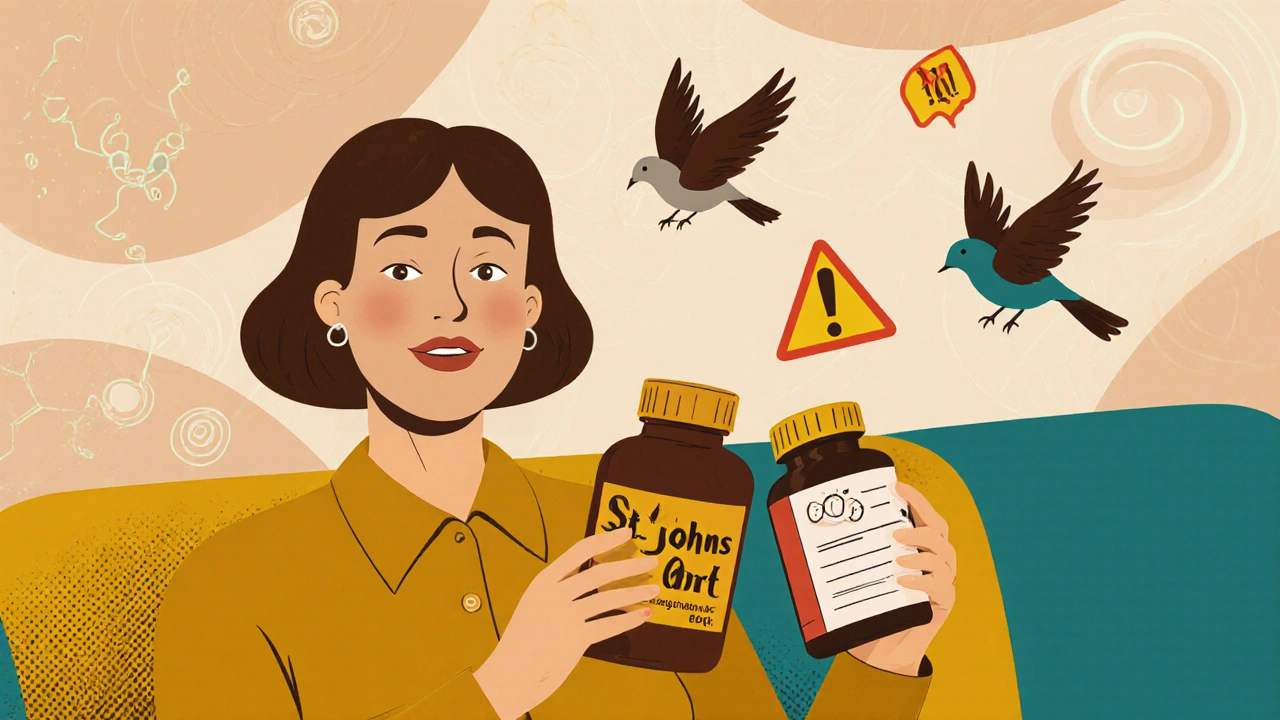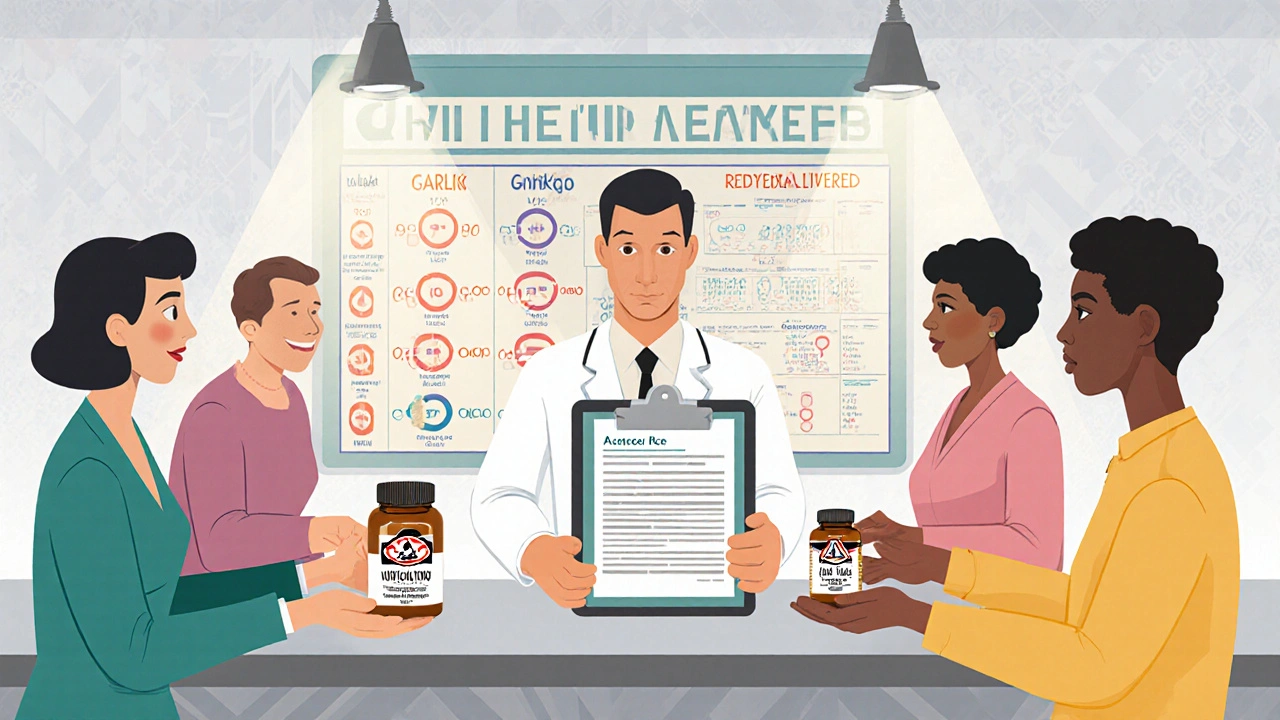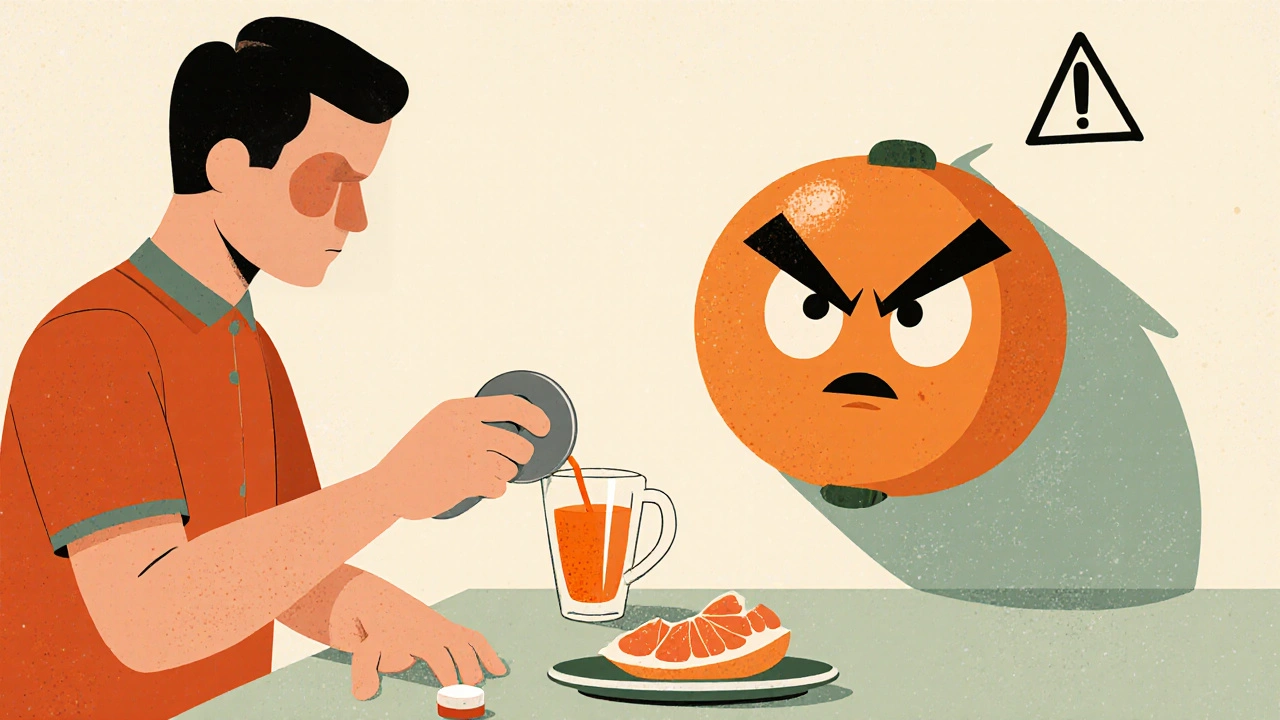Imagine taking your blood pressure pill with a glass of grapefruit juice, or popping a daily garlic supplement while on warfarin. Sounds harmless, right? But these everyday choices can turn dangerous-fast. Drug interactions aren’t just rare side effects. They’re a quiet, widespread threat that sends tens of thousands to hospitals every year, often because no one ever asked the right questions.
Why Your Dinner Can Sabotage Your Medicine
It’s not just about pills. What you eat, drink, or take as a supplement can change how your medication works-sometimes dramatically. The most famous example? Grapefruit. One glass can make your statin, like simvastatin, work 15 times harder than it should. That spike in drug levels doesn’t just cause nausea. It can trigger rhabdomyolysis, a condition where muscle tissue breaks down and floods your kidneys with toxins. The risk jumps from 0.15 cases per 100,000 people to 1.57 per 100,000 just because of a single fruit.It’s not just grapefruit. Cranberry juice? It’s been linked to over 28 cases of dangerous bleeding in people taking warfarin. Green tea? High in vitamin K, which directly fights warfarin’s blood-thinning effect. Even a single serving of cooked spinach (about 150g) can slash warfarin’s effectiveness by 30-40% in less than a day. That’s not a myth. That’s a documented medical emergency waiting to happen.
Supplements Are Not Always Safe
Many people assume supplements are harmless because they’re “natural.” That’s a dangerous myth. St. John’s wort, for example, is one of the most dangerous supplements on the market. It doesn’t just interfere with one drug-it affects over half of all prescription medications. How? By turning on liver enzymes that break down drugs too fast.If you’re on birth control, St. John’s wort can make you pregnant-even if you take your pill religiously. If you’re on antidepressants like SSRIs, it can trigger serotonin syndrome: a life-threatening surge of body temperature, muscle stiffness, and heart rhythm chaos. And if you’re on HIV meds? Its effect can drop drug levels by 80%, leading to treatment failure and drug-resistant viruses.
Other high-risk supplements include:
- Ginkgo biloba: Doubles bleeding risk when taken with aspirin or warfarin. One study showed it can extend bleeding time by 30-50%.
- Garlic supplements: Linked to 32 case reports of uncontrolled bleeding with blood thinners.
- Red yeast rice: Contains a natural statin. Taking it with prescription statins can increase muscle damage risk by 2.3 times.
- Coenzyme Q10: May weaken the effect of statins, making them less effective at lowering cholesterol.
The FDA says 23% of serious supplement-related adverse events between 2013 and 2019 were caused by interactions. And here’s the kicker: most people never tell their doctor they’re taking them.

The Hidden Mechanism: How Your Body Breaks Down Drugs
Understanding why these interactions happen helps you avoid them. It all comes down to your liver-specifically, a group of enzymes called cytochrome P450 (CYP450). These enzymes are like your body’s drug processors. Some foods and supplements turn them up, others turn them down.St. John’s wort and certain herbs turn CYP3A4 on. That means your body breaks down drugs like cyclosporine, oral contraceptives, and many antidepressants too fast. Result? The drug doesn’t work. You might think your treatment failed. It didn’t. Your supplement did.
On the flip side, grapefruit, pomegranate, and some other foods turn CYP3A4 off. That means drugs build up in your blood. A little bit becomes too much. A safe dose becomes toxic.
Then there’s vitamin K. It doesn’t touch liver enzymes. It works directly on your blood’s clotting system. Warfarin blocks vitamin K. So if you eat a salad one day and a steak the next, your INR (a blood test that measures clotting time) swings wildly. That’s why doctors tell you to eat consistent amounts of vitamin K-not avoid it entirely. Aim for 90mcg daily for women, 120mcg for men. That’s about one cup of cooked kale or spinach, every day.
What You Can Do Right Now
You don’t need to stop all supplements. You don’t need to live on plain rice and chicken. You just need to be smart. Here’s how:- Make a full list of everything you take. Not just prescriptions. Include over-the-counter meds, vitamins, herbs, and even occasional supplements like melatonin or turmeric. Write it down. Update it every time you see a doctor or pharmacist.
- Bring it to every appointment. Don’t assume your doctor knows. Studies show 70% of patients don’t mention supplements. That’s a gap that can kill.
- Ask your pharmacist. Pharmacists are trained to spot interactions. A 2022 study found pharmacist-led reviews cut adverse events by 22%. Ask: “Does this interact with anything I’m taking?”
- Use free tools. The FDA’s MedlinePlus drug interaction checker covers over 3,500 medications and supplements. It’s free, reliable, and updated regularly.
- Don’t start a new supplement without asking. Even “safe” ones like fish oil or magnesium can interfere. Your blood pressure pill? Your heart medication? Your antidepressant? All of them could be affected.

Who’s Responsible?
The system isn’t perfect. Supplement labels rarely warn about interactions. The Government Accountability Office found only 29% of supplement labels include any interaction warning-compared to 100% on prescription bottles. That’s not an accident. It’s a loophole.Pharmacists, doctors, and patients all have roles. But patients hold the most power. You’re the only one who knows what’s in your medicine cabinet. You’re the only one who notices if you feel different after starting a new pill or tea.
And the cost? It’s huge. Dr. Michael Cohen of the Institute for Safe Medication Practices says drug-supplement interactions cost the U.S. $177 billion a year in preventable care. That’s not just money. It’s hospital beds, ER visits, and lives lost.
What’s Changing?
There’s hope. The FDA now requires new drugs to be tested for interactions with common supplements. The National Institutes of Health spent $15.7 million in 2022 alone on research into interactions with echinacea, black cohosh, and saw palmetto. Hospitals using AI-powered clinical tools like Epic’s interaction checker reduced dangerous prescribing by 37%.Consumer awareness is rising too. A 2022 survey found 61% of supplement users now check for interactions before buying-up from 43% in 2018. That’s progress. But it’s not enough.
Real change happens when patients stop assuming. Stop guessing. Start asking.
Can I still drink grapefruit juice if I’m on medication?
It depends on your medication. Grapefruit juice blocks enzymes that break down certain drugs, making them dangerously strong. It’s risky with statins (like simvastatin), blood pressure meds (like felodipine), and some anti-anxiety drugs. If you’re unsure, check with your pharmacist or use the MedlinePlus interaction checker. For safety, avoid grapefruit juice entirely unless your provider says it’s okay.
Are herbal supplements safer than prescription drugs?
No. Just because something is “natural” doesn’t mean it’s safe. Herbs like St. John’s wort, ginkgo, and garlic have powerful effects on your body and can interact with prescription drugs just like chemicals do. Many herbal supplements aren’t tested for safety the way prescription drugs are. They’re sold as food, not medicine-so they don’t have to prove they’re safe before hitting shelves.
I take warfarin. Should I avoid leafy greens completely?
No. You should eat them consistently. Warfarin works by blocking vitamin K, which helps your blood clot. If you eat spinach one day and none the next, your INR will swing. Instead, aim for the same amount every day-about 90mcg for women, 120mcg for men. That’s roughly one cup of cooked kale or spinach daily. Consistency matters more than avoidance.
Can I take supplements with my antibiotics?
Some can interfere. Calcium, iron, and magnesium supplements can bind to antibiotics like tetracycline and ciprofloxacin, making them less effective. Take them at least 2 hours apart. Probiotics may help prevent antibiotic-related diarrhea, but don’t take them at the same time as the antibiotic. Always check with your pharmacist before combining.
Why don’t supplement labels warn about drug interactions?
Because they don’t have to. Under U.S. law, supplements are regulated as food, not drugs. That means manufacturers don’t need FDA approval before selling them, and they aren’t required to list interaction warnings. Only 29% of supplement labels include any interaction warning-compared to 100% on prescription bottles. That’s a major gap in patient safety.
How do I know if a supplement is interacting with my medicine?
Watch for sudden changes: unexplained bruising, dizziness, nausea, unusual fatigue, or changes in heart rate. If you start a new supplement and feel worse-or if your medication seems to stop working-it could be an interaction. Don’t guess. Call your pharmacist. Bring your supplement bottle. They can check it in seconds.
Can my pharmacist check for interactions?
Yes-and they should. Pharmacists are trained to catch interactions before they happen. Many pharmacies offer free medication reviews that include supplements. Ask for one. Studies show these reviews reduce adverse events by 22%. Don’t wait for a problem. Prevent it.
Medication safety isn’t about fear. It’s about awareness. You don’t need to avoid food or supplements entirely. You just need to know what’s in your body-and who to ask when you’re not sure. Your next doctor’s visit isn’t just about your symptoms. It’s about your medicine cabinet. Bring it. Ask. Protect yourself.


Andrew Cairney
November 18, 2025 AT 03:50So let me get this straight - the FDA lets companies sell poison labeled as 'natural supplements' but screams if you take ibuprofen with alcohol? 😂 This isn't medicine, it's a capitalist loophole with a yoga mat. They don't test supplements because they don't WANT to know what's killing people. Big Pharma owns the FDA. Grapefruit juice? They'd rather you die quietly than admit their $200 statin is useless without a fruit.
And don't even get me started on 'pharmacists'. They're just cashiers with white coats. 🤡
Rob Goldstein
November 19, 2025 AT 08:56Really glad someone laid this out so clearly. The CYP450 system is the unsung hero (and villain) of pharmacology - and most patients have zero clue how it works. St. John’s wort inducing serotonin syndrome? That’s not a side effect, that’s a biochemical hostage situation. And vitamin K consistency? Absolute gold. I tell every warfarin patient: 'Your kale is your co-pilot, not your enemy.' Consistency > avoidance. Also - yes, ask your pharmacist. They’re the real MVPs who catch 80% of these before they hit the bloodstream. 🙌
Matt Wells
November 19, 2025 AT 19:25While the general sentiment of this article is commendable, the editorial tone betrays a concerning conflation of correlation with causation. The cited incidence rates for rhabdomyolysis, for instance, are presented without adjustment for confounding variables such as age, renal function, or concomitant statin dosage. Moreover, the assertion that 'one glass' of grapefruit juice induces a 15-fold increase lacks citation to primary literature. The referenced study by Bailey et al. (1998) demonstrated a 3- to 5-fold increase in Cmax - not 15-fold - under controlled pharmacokinetic conditions. Precision matters. Misinformation, even well-intentioned, undermines public trust in evidence-based medicine.
Margo Utomo
November 21, 2025 AT 08:31Okay but imagine being the person who Googled 'is turmeric safe with blood pressure meds' and found THIS. 🙏
Also - why do we treat supplements like they're candy? You wouldn't give your kid a handful of Adderall because it's 'natural', so why are we popping St. John’s wort like M&Ms? 🍫
PS: My pharmacist gave me a free interaction printout last week. It was like a Netflix documentary about my medicine cabinet. I cried. Not because I was sad - because I realized I'd been a dumbass for 3 years. 🤦♀️
George Gaitara
November 22, 2025 AT 02:54So you’re telling me I can’t have my garlic pills AND my fish oil AND my morning green smoothie? What is this, a communist diet? I’ve been taking 6 different supplements since 2017 and my cholesterol’s never been better. This is just Big Pharma’s way of keeping you dependent on their $500/month pills. Also, who says I need a doctor to tell me what to take? I’ve read three blogs and a YouTube video by a guy who ‘used to be a nurse.’ I’m fine.
Deepali Singh
November 22, 2025 AT 07:30Statistical noise. The 28 cases of cranberry-warfarin bleeding? Out of how many millions of users? 0.0001% - and that’s assuming all reports are valid. Meanwhile, the real killer is polypharmacy in the elderly - not grapefruit. Also, vitamin K variability is a non-issue for patients on DOACs. Why are we still treating warfarin like the 1980s? This article is outdated. And yes, I’ve read the original papers.
Sylvia Clarke
November 22, 2025 AT 10:44It’s wild how we treat food like a threat and pharmaceuticals like divine intervention. We’re terrified of spinach but trust a $100 pill with no long-term safety data? The real tragedy isn’t the interaction - it’s the cultural arrogance that says ‘I know better than my body’ while ignoring the simplest fix: consistency. Eat your kale. Don’t panic. Don’t quit. Just… be steady. And for the love of all that’s holy, tell your pharmacist you’re taking ‘that herbal thing’ - even if you think it’s ‘just chamomile.’
Also - who wrote this? I’m in love. 🥹
Jennifer Howard
November 23, 2025 AT 15:37It is imperative to emphasize that the dissemination of such information, while ostensibly beneficial, may inadvertently promote non-compliance with evidence-based regimens among the medically vulnerable. I have personally observed patients discontinuing statins due to fear of grapefruit juice - a behavior that is statistically correlated with increased cardiovascular mortality. Furthermore, the implication that pharmacists are ‘trained to catch interactions’ is misleading; many are underpaid, overworked, and lack access to comprehensive databases. One must not mistake accessibility for accuracy. This article, while emotionally compelling, lacks the gravitas of peer-reviewed literature and risks inciting pharmaceutical phobia.
mike tallent
November 25, 2025 AT 10:59Bro, I take magnesium, vitamin D, and fish oil every day. My doctor said it’s fine. I even told him I take turmeric for my knees. He laughed and said, 'You’re doing better than 90% of people.'
Also, I drink grapefruit juice with my blood pressure med. No issues. Maybe your body’s just weak? 🤷♂️
Joyce Genon
November 26, 2025 AT 14:02Let’s be real - this whole article is fearmongering dressed up as public health. You list 6 supplements as dangerous, but not one of them is regulated like a drug, so of course they’re risky - but so is driving a car, eating sugar, or breathing air. The real problem? Doctors don’t have time to talk to you, so they outsource safety to a 20-minute pharmacist review that costs $15. Meanwhile, the FDA approves new antidepressants with 12-week trials and calls it ‘science.’ The inconsistency is staggering. Also, St. John’s wort? It’s been used for centuries. Maybe your body doesn’t need a synthetic SSRI to feel okay. Just saying.
John Wayne
November 28, 2025 AT 13:56How quaint. You assume the average person cares about CYP450 enzymes or INR values. Most people take pills because their doctor told them to, and supplements because they saw an ad. The real issue isn’t grapefruit - it’s the commodification of health anxiety. This article is just another monetized fear-bait piece designed to sell books, podcasts, and ‘medication review’ services. You’re not helping. You’re profiting off ignorance. And for the record - I’ve been on statins for 8 years. I eat grapefruit. I’m fine. Your data doesn’t apply to me.
Margo Utomo
November 29, 2025 AT 01:57Just read the comment above - and I’m crying. Not because I’m sad. Because this is why we need more pharmacists. 🤦♀️
‘I’m fine’ is the most dangerous phrase in medicine. I had a patient say that after his INR went to 8.7. He was drinking grapefruit juice, taking garlic, and had just started turmeric. He didn’t think it mattered. He ended up in the ER with a brain bleed. He’s fine now. But he’s not ‘fine.’ He’s terrified. And he’s not alone.
So if you’re reading this and thinking ‘I’m fine’ - please, for the love of your liver, go talk to someone who’s not your cousin on Reddit. 🙏